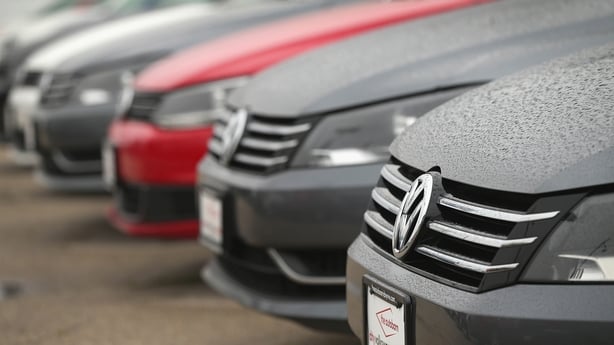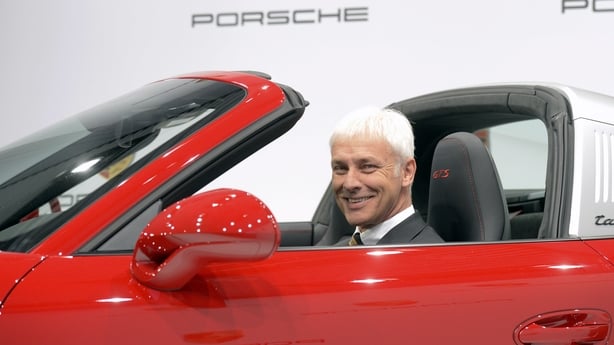German prosecutors today launched an investigation into former Volkswagen boss Martin Winterkorn over the rigging of vehicle emissions tests.
The move comes as the carmaker suspended three top engineers in an attempt to tackle the crisis.
The investigation into Mr Winterkorn, who quit on Wednesday after almost nine years at the helm of Europe's largest carmaker, is into "allegations of fraud in the sale of cars with manipulated emissions data," the prosecutor's office said.
German media said that Mr Winterkorn was demanding his salary for the rest of his contract through the end of next year but the board did not want to pay it.
Mr Winterkorn was paid €16m last year, the most of any CEO in Germany's blue chip DAX index.
Volkswagen, which has admitted to cheating diesel emissions tests in the US, is under huge pressure to get to grips with the biggest business scandal in its 78-year history.
It named company veteran Matthias Mueller on Friday as chief executive and agreed to appoint a US law firm to conduct a full investigation.
Sources familiar with the matter said today it had also suspended the heads of research and development at its core VW brand, luxury division Audi and sports car maker Porsche.
But the crisis shows no sign of dying down.
Two German newspapers said on Sunday that Volkswagen's own staff and one of its suppliers had warned years ago about the illegal use of so-called "defeat devices" to detect when a car was being tested and alter the running of its diesel engine to conceal their emissions of toxic nitrogen oxides.
Environmental campaign group Transport & Environment published new data showing that some new Mercedes, BMW and Peugeot cars use 50% more fuel than laboratory tests show, saying this was evidence of a wider industry problem.
T&E, which works closely with the European Commission, said its data did not prove other firms were using defeat devices.
But it said the gap between lab results and road performancehad grown to such an extent for emissions of both carbon dioxide and nitrogen oxides that further investigation was needed to discover what carmakers were doing to mask emissions.
ACEA, the European Automobile Manufacturers' Association, which represents top car makers, has said there is no evidence the use of defeat devices is an industry-wide issue. In a statement today, it said it supported the development of updated testing.
US and European regulators have said they are working on tighter rules.
 Volkswagen shares have plunged about 35% since it admitted to cheating US emissions tests, wiping more than €25 billion from its market value.
Volkswagen shares have plunged about 35% since it admitted to cheating US emissions tests, wiping more than €25 billion from its market value.
It faces investigations and potential fines from regulators and prosecutors, as well as lawsuits from cheated customers.
The crisis is an embarrassment for Germany, which has for years held up Volkswagen as a model of the country's engineerin gprowess and has lobbied against some attempts to tighten regulations on automakers.
The German car industry employs more than 750,000 people and is a major source of export income.
The scandal has also rocked the wider car market, with manufacturers fearing a drop in diesel car sales and more costly regulations, and customers furious that Volkswagen has not given more details about what might happen to their cars.
The company has said 11 million cars worldwide had defeat devices installed.
Audi said today that 2.1 million of these were its own models, including the A1, A3, A4, A5, A6, TT, Q3and Q5.
But it has still not said whether the affected models would have to be recalled and refitted.
"VW is in a dramatic situation. It will be far from easy to restore the reputation of the company and win back trust from customers," new CEO Mueller, a former boss of Porsche sports-cars, said in a letter to the division's staff seen by Reuters.

Sources close to the matter told Reuters today that the company had suspended VW brand development chief Heinz-Jakob Neusser; Audi's R&D boss Ulrich Hackenberg, who also oversees technical development across the group; and Porsche's Wolfgang Hatz, also head of group engine and transmissions development.
One source said Hackenberg was taking legal action against the decision. Volkswagen and Audi declined to comment, while the suspended executives could not immediately be reached.
Switzerland said on Friday it was banning sales of Volkswagen cars affected by the scandal, while the company's Italian arm has also told dealers to stop selling them, Italy's Corriera della Sera newspaper reported on Sunday.
Independent Polish car brokerage North Invest said today it would stop selling Volkswagen cars with 2.0 TDI engines until the company sorted out its problems.
Diesel engines use less fuel and emit less carbon - blamed for global warming - than standard petrol engines. But they emit higher levels of toxic nitrogen oxides, blamed for deaths from lung and heart disease. In most of the world, including the US, diesel engines in passenger cars are a niche product.
But their fuel economy and low carbon emissions have made them popular in Europe, where they now account for half of vehicles sold.
Volkswagen and other European manufacturers have promoted "clean diesel" technology, benefiting from diesel's fuel economy but meeting stringent tests for emissions of toxins.
The suggestion that this was achieved by cheating on tests could affect the viability of the entire diesel sector.

